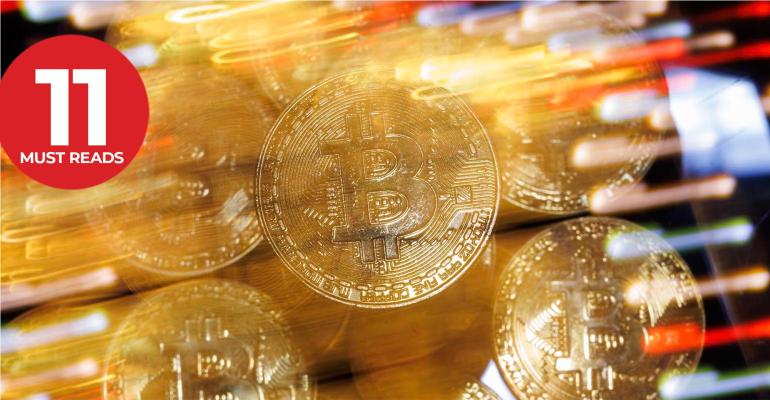- Largest Spot Bitcoin ETFs Plagued by First Outflows “That ETF has had outflows for three-and-a-half months straight, with investors pulling $17.1 million from the fund. But now other spot bitcoin ETFs, like the Fidelity Wise Origin Bitcoin Fund (FBTC)—the third-largest U.S.-listed spot bitcoin ETF with $9.9 billion in assets under management—have started to suffer outflows as well.” (ETF.com)
- The Unfulfilled Potential of Fractional Real Estate Investment Platforms “While the sector has seen its share of failures, like those of PeerStreet, Here, and LEX, the success of Fundrise and the potential revitalization of Cadre by Yieldstreet suggest the model is not dead yet. The future of fractional real estate investment will likely hinge on enhanced regulatory frameworks, technological advancements, and more interest in commercial real estate assets from retail investors.” (Propmodo)
- Five ETF Trends to Watch Right Now “According to Morningstar analysts, the U.S. stock market is overvalued by 3%. How long can it continue its run? David Sekera, market strategist at Morningstar, recently warned that ‘what has worked over the past year and a half is unlikely to continue to do so in the future’ and that consequently it is time for ‘contrarian choices.’” (Morningstar)
- This Hidden Cost of Mutual Funds That Boosts ETFs “Mutual funds see more distributions than ETFs, which see more money lost to taxes. That hidden cost of mutual funds sees half of all U.S. equity mutual funds distributing capital gains, compared to just 2.5% of ETFs per American Century Investments. That already poses some challenges to investors, but what’s worse is that the average tax cost ratio of a mutual fund often outpaces its average expense ratio.” (VettaFi)
- What Can Private Funds Offer You? “And as varied as these private investments are, they share a number of structural characteristics. The first is illiquidity. Once an investment is made, those assets are committed for a significant period of time (often years) before the expectation of a return, in theory giving the management team the space that it needs to make a go of the endeavor. The second is a high barrier to entry for investors, a result of large commitment minimums and high fees relative to those of marketable public securities.” (Morningstar)
- KKR Infra Fund Sits at $11B Six Months after Fundraising Kick-Off “KKR's first global infrastructure fund posted a gross internal rate of return, or IRR, of 17.6%. So far, the second pool has generated a gross IRR of 19.7%, KKR Global Head of Infrastructure Raj Agrawal said at an investors' event earlier this month.” (FundFire)
- Hong Kong Bitcoin & Ether ETFs See $11M Volume on First Day “The Hong Kong Spot Bitcoin and Ethereum ETFs have seen $11 million in volume on what was their first trading day according to data from the Hong Kong Stock Exchange. Indeed, the six inaugural offerings for the Chinese regions officially debuted early Tuesday. Of the product’s issuers, ChinaAMC led all Spot Bitcoin ETFs with $4.75 million.” (Watcher.guru)
- FTC’s Non-Compete Ban Could Lead to ‘Draconian’ NDAs, Non-Solicit Agreements “The industry scored a win when the FTC revised it's initial proposal to allow existing non-compete agreements to remain in place for senior executives making more than $151,164 per year. The FTC also nixed a provision associated with the sale of a business, in which all owners—not just those with at least a 25% stake in the entity, as initially proposed—would still be subject to non-compete clauses.” (FundFire)
- Energy Security: Implications For The Sector “Geopolitical instability and deglobalisation have increased the need for local energy sources, argues Schroders, the UK-listed wealth and investment house.” (WealthBriefing)
- BREIT Sells 19 Student Housing Assets to KKR for More Than $1.6 Billion “BREIT, a publicly registered non-traded real estate investment trust, and KKR recently announced the definitive agreement for funds managed by KKR to acquire a portfolio of 19 purpose-built student housing properties. The transaction is expected to close by the third quarter of 2024, subject to customary closing conditions.” (The DI Wire)
- There’s ‘No Going Back’ For Insurance Company Investment Portfolios, KKR Says “Insurers tend to have more conservative portfolios than other institutional investors to protect their bottom line, should claims be higher than risk models expected. In a low rate environment with less risky assets like fixed income yielded little, insurers were unable to write as many policies as they might have in the past.” (Institutional Investor)
0 comments
Hide comments





